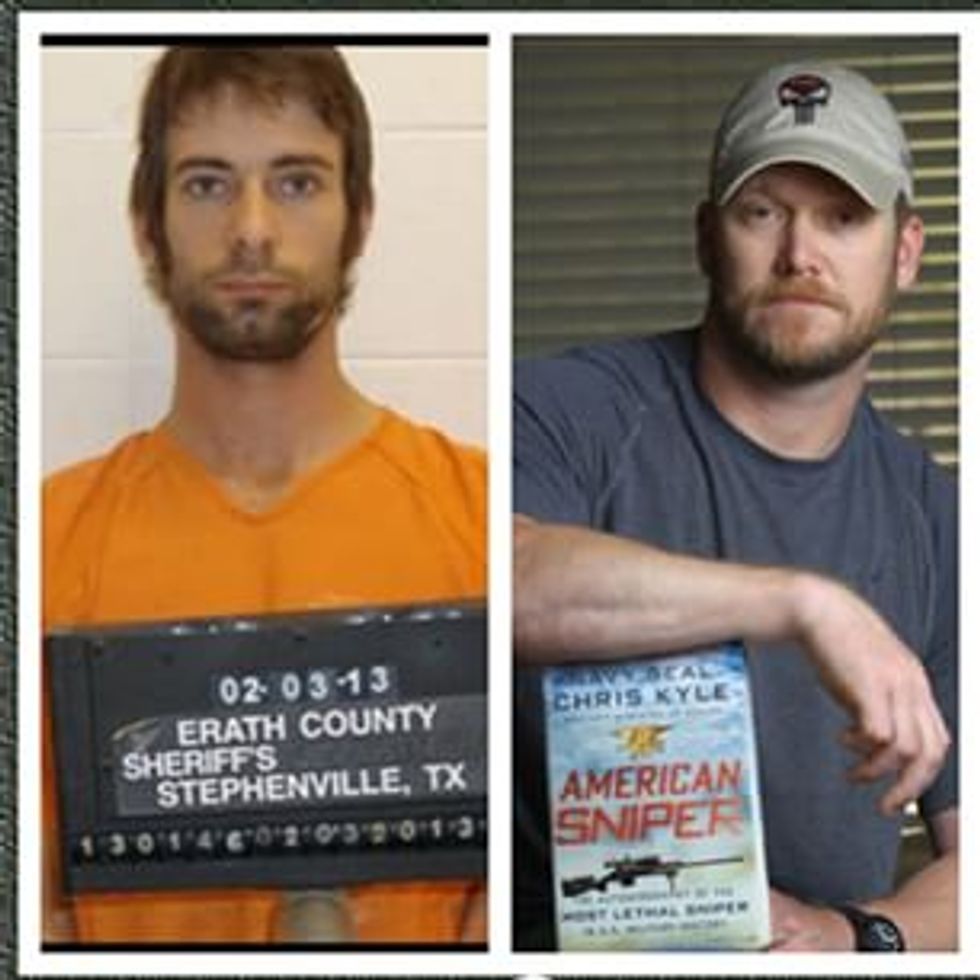
© 2025 Blaze Media LLC. All rights reserved.
Did Chris Kyle's Alleged Killer Really Have PTSD? Expert's Analysis Sheds New Light on Big Claim
February 06, 2015
Former U.S. Marine responds: "Everyone thinks they know what PTSD is. Even some of the experts don’t have a clue."
Even if Eddie Ray Routh, the former U.S. Marine accused of murdering Navy SEAL sniper Chris Kyle and Chad Littlefield, never saw any combat during his time in Iraq, he could still have returned home suffering from post-traumatic stress disorder, according to the analysis of one expert.
Dr. Jason Powers, chief medical officer of Right Step and Promises Austin, told TheBlaze in a Friday phone interview that merely being stationed overseas in a place where “atrocities” are occurring can “absolutely” cause PTSD in some people. In an effort to keep his analysis objective, we did not ask him to comment specifically on Routh's case.
“If you’re in an environment where you know atrocities are happening that is traumatic,” he said.
 Eddie Ray Routh was charged with murder in the deaths of Chris Kyle and Chad Littlefield. (Credit: Erath County Sheriff’s Office)
Eddie Ray Routh was charged with murder in the deaths of Chris Kyle and Chad Littlefield. (Credit: Erath County Sheriff’s Office)
He continued, "Say you are stationed overseas during engagement. You might be the cook, but you are dealing with human beings and you know what they are facing. It’s like, 'Jon was here yesterday, but he’s not here today with the rest of his unit.' No one has to tell you what happened for that to take a toll."
The Warfighter Foundation, a nonprofit serving military veterans, told TheBlaze in an interview on Thursday that they have spoken to U.S. Marine sources who confirmed Routh never saw any combat or experienced any traumatic experiences while serving at Balad Air Base in Iraq. Spencer Walker, board president of the Warfighter Foundation and Marine combat veteran, said the group doesn’t believe Routh was suffering from PTSD when he killed Kyle and Littlefield.
In a follow-up discussion regarding Powers' analysis on Friday, Walker still expressed skepticism that Routh really was suffering from PTSD and said he believes Routh's mental issues were present before his military service.
Meanwhile, Powers told TheBlaze he knows of civilian contractors that served in non-military roles overseas who returned to the United States suffering from PTSD.
“They are pipe fitters, machinists or whatever else,” he added. “I’m not saying it happens to every one of them, but it does happen.”
He clarified that the type of PTSD someone might suffer from after “stepping on a land mine or seeing the guy next to you step on a land mine” wouldn’t be the same as someone who didn’t have traumatic combat experiences.
Powers explained that PTSD can cause flashbacks, disassociation, anxiety, depression, sleeplessness and other symptoms. He said people many times turn to drugs and alcohol to cope with the disorder. Walker told TheBlaze he thinks drug and alcohol abuse could have played a role in Routh's apparent downward spiral, an angle his group is still investigating.
Dr. Powers also said, in his experience, the struggle of PTSD is usually more internal than external -- as in, the disorder can cause an individual to become suicidal, but usually not homicidal with a desire to kill others.
But he was clear to note a person’s experience with PTSD can vary, saying, “It’s not an all or nothing deal — we’re talking about a very complicated issue.”
 Chris Kyle (Image: 5.11 tactical gear company)
Chris Kyle (Image: 5.11 tactical gear company)
The Warfighter Foundation has asserted that Routh held a "non-combat arms occupation," saw "no combat" and was "an individual with psychological problems that were not associated with his service."
Walker told TheBlaze the veterans group is trying to "conclude what led up over the course of [Routh's] military service that led to Feb. 2, 2013," the day Kyle and Littlefield were killed.
As a Marine combat veteran, he also claimed even many experts don't have a good grasp on what PTSD really is.
He did admit that it is certainly possibly for a veteran who didn't serve in combat to develop PTSD-like symptoms, but said, in his opinion, it seems unlikely Routh's personal experience was accompanied by enough stress to cause the disorder. He also argued PTSD is one of the most over-diagnosed disorders in military veterans.
"Everyone thinks they know what PTSD is. Even some of the experts don’t have a clue," he concluded.
Read TheBlaze's original report on the Warfighter Foundation's findings on Routh's military service here.
---
Want to leave a tip?
We answer to you. Help keep our content free of advertisers and big tech censorship by leaving a tip today.
Want to join the conversation?
Already a subscriber?
more stories
Sign up for the Blaze newsletter
By signing up, you agree to our Privacy Policy and Terms of Use, and agree to receive content that may sometimes include advertisements. You may opt out at any time.
© 2025 Blaze Media LLC. All rights reserved.
Get the stories that matter most delivered directly to your inbox.
By signing up, you agree to our Privacy Policy and Terms of Use, and agree to receive content that may sometimes include advertisements. You may opt out at any time.


